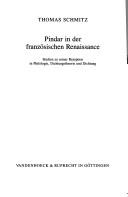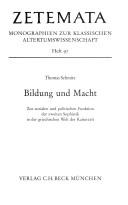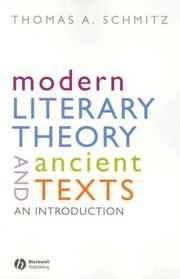| Listing 1 - 10 of 18 | << page >> |
Sort by
|

ISBN: 3525252013 9783525252017 Year: 1993 Volume: 101 Publisher: Göttingen: Vandenhoeck und Ruprecht,
Abstract | Keywords | Export | Availability | Bookmark
 Loading...
Loading...Choose an application
- Reference Manager
- EndNote
- RefWorks (Direct export to RefWorks)
French literature --- Littérature française --- Greek influences --- Influence grecque --- Pindar --- Influence --- -French literature --- -History and criticism --- -Pindarus --- Pindare --- Pindaro --- Πίνδαρος --- -Influence --- -Pindar --- Píndaro --- Pindaros --- Littérature française --- History and criticism --- Appreciation --- Influence. --- Pindarus --- French poetry --- 16th century --- Greek influences. --- French literature - 16th century - History and criticism --- French literature - Greek influences --- Pindar - Appreciation - France --- Pindar - Influence

ISBN: 3406428517 9783406428517 Year: 1997 Volume: 97 Publisher: München: Beck,
Abstract | Keywords | Export | Availability | Bookmark
 Loading...
Loading...Choose an application
- Reference Manager
- EndNote
- RefWorks (Direct export to RefWorks)
Greek literature --- Sophists (Greek philosophy) --- Philosophy, Ancient --- Littérature grecque --- Sophistes grecs --- Philosophie ancienne --- History and criticism --- Social aspects --- Political aspects --- Histoire et critique --- Aspect politique --- Aspect social --- Education, Greek --- Ancient Greek education --- Greek education --- Education --- Education, Greek. --- Sophists (Greek philosophy). --- Littérature grecque --- Social aspects.

ISBN: 9781405153744 9781405153751 Year: 2007 Publisher: Malden, MA : Blackwell,
Abstract | Keywords | Export | Availability | Bookmark
 Loading...
Loading...Choose an application
- Reference Manager
- EndNote
- RefWorks (Direct export to RefWorks)
This book provides students and scholars of classical literature with a practical guide to modern literary theory and criticism. Using a clear and concise approach, it navigates readers through various theoretical approaches, including Russian Formalism, structuralism, deconstruction, gender studies, and New Historicism. Applies theoretical approaches to examples from ancient literature Extensive bibliographies and index make it a valuable resource for scholars in the field
Criticism --- Classical literature --- Critique --- Littérature ancienne --- History --- History and criticism. --- Criticism, Textual. --- Histoire --- Histoire et critique --- Critique textuelle --- Littérature ancienne --- Criticism, Textual --- History and criticism

ISBN: 3534152042 9783534152049 Year: 2002 Publisher: Darmstadt: Wissenschaftliche Buchgesellschaft,
Abstract | Keywords | Export | Availability | Bookmark
 Loading...
Loading...Choose an application
- Reference Manager
- EndNote
- RefWorks (Direct export to RefWorks)
Classical literature --- Criticism --- History and criticism --- Criticism, Textual --- 82.0 --- 87 --- -Classical literature --- -Criticism --- -Appraisal of books --- Books --- Evaluation of literature --- Literary criticism --- Literature --- Rhetoric --- Aesthetics --- Style, Literary --- Literature, Classical --- Literature, Ancient --- Greek literature --- Latin literature --- Literatuurtheorie --- Klassieke literatuur --- Appraisal --- Technique --- Evaluation --- Criticism, Textual. --- History and criticism. --- History --- 87 Klassieke literatuur --- 82.0 Literatuurtheorie --- -Literatuurtheorie --- -87 Klassieke literatuur --- Classical literature - History and criticism --- Criticism - 20th century --- Classical literature - Criticism, Textual

ISBN: 0470691530 0470692294 1281309230 1405153741 140515375X 9786611309237 Year: 2007 Publisher: Wiley-Blackwell
Abstract | Keywords | Export | Availability | Bookmark
 Loading...
Loading...Choose an application
- Reference Manager
- EndNote
- RefWorks (Direct export to RefWorks)
Article
Abstract | Keywords | Export | Availability | Bookmark
 Loading...
Loading...Choose an application
- Reference Manager
- EndNote
- RefWorks (Direct export to RefWorks)
Digital
ISBN: 9783110227376 9783110390650 9783110188240 Year: 2016 Publisher: Berlin ;; Boston De Gruyter
Abstract | Keywords | Export | Availability | Bookmark
 Loading...
Loading...Choose an application
- Reference Manager
- EndNote
- RefWorks (Direct export to RefWorks)
Book
ISBN: 9783515096713 351509671X Year: 2011 Publisher: Stuttgart: Franz Steiner,
Abstract | Keywords | Export | Availability | Bookmark
 Loading...
Loading...Choose an application
- Reference Manager
- EndNote
- RefWorks (Direct export to RefWorks)
In the first century BCE, Greek intellectuals had to come to terms with the stability of Roman power. Many of them were active in Rome, which became the cultural centre of the Greek world ; others were connected with Roman patrons. Their work became important for the emergence of Greek identity in the Roman Empire. Bringing together an international group of leading Classical scholars, this volume represents the first attempt at a comprehensive study of Greek cultural identity in the first century : how did the Romans influence the Greeks' view(s) of themselves and of their classical heritage ? How did the Greeks interpret the Romans and their role in the world ? Covering such different genres as historiography, literary criticism, the novel, and epigram, as well as archaeological material, the contributions explore the intellectual diversity of one of the most significant periods in history and situate the authors active under Augustus within their broader intellectual-historical context.
Group identity --- Greeks --- Identité collective --- Grecs --- History --- Histoire --- Greece --- Grèce --- Civilization --- Roman influences --- Intellectual life --- Classical influences --- Civilisation --- Influence romaine --- Vie intellectuelle --- Influence ancienne --- Identité collective --- Grèce --- Collective identity --- Community identity --- Cultural identity --- Social identity --- Identity (Psychology) --- Social psychology --- Collective memory --- Ethnology --- Mediterranean race --- Griechenland --- Hellas --- Yaṿan --- Vasileion tēs Hellados --- Hellēnikē Dēmokratia --- République hellénique --- Royaume de Grèce --- Kingdom of Greece --- Hellenic Republic --- Ancient Greece --- Ελλάδα --- Ellada --- Ελλάς --- Ellas --- Ελληνική Δημοκρατία --- Ellēnikē Dēmokratia --- Elliniki Dimokratia --- Grecia --- Grčija --- Hellada --- اليونان --- يونان --- al-Yūnān --- Yūnān --- 希腊 --- Xila --- Греция --- Gret︠s︡ii︠a︡ --- History. --- Group identity - Greece - History - Congresses --- Greeks - Rome - Congresses --- Greece - Civilization - Roman influences - Congresses --- Greece - Intellectual life - Classical influences - Congresses
Book
ISBN: 9783825361662 3825361667 Year: 2013 Volume: 139 Publisher: Heidelberg: Winter,
Abstract | Keywords | Export | Availability | Bookmark
 Loading...
Loading...Choose an application
- Reference Manager
- EndNote
- RefWorks (Direct export to RefWorks)
Classical literature --- Literary form --- Littérature ancienne --- Genres littéraires --- History and criticism. --- History --- Appreciation --- Histoire et critique --- Histoire --- Appréciation --- Schwinge, Ernst-Richard --- History and criticism --- Festschrift - Libri Amicorum --- Littérature ancienne --- Genres littéraires --- Appréciation --- Classical literature - History and criticism --- Literary form - History - To 1500 --- Classical literature - Appreciation - Germany
Book
ISBN: 9783899713527 Year: 2007 Publisher: Göttingen V&R Unipress
Abstract | Keywords | Export | Availability | Bookmark
 Loading...
Loading...Choose an application
- Reference Manager
- EndNote
- RefWorks (Direct export to RefWorks)
| Listing 1 - 10 of 18 | << page >> |
Sort by
|

 Search
Search Feedback
Feedback About UniCat
About UniCat  Help
Help News
News